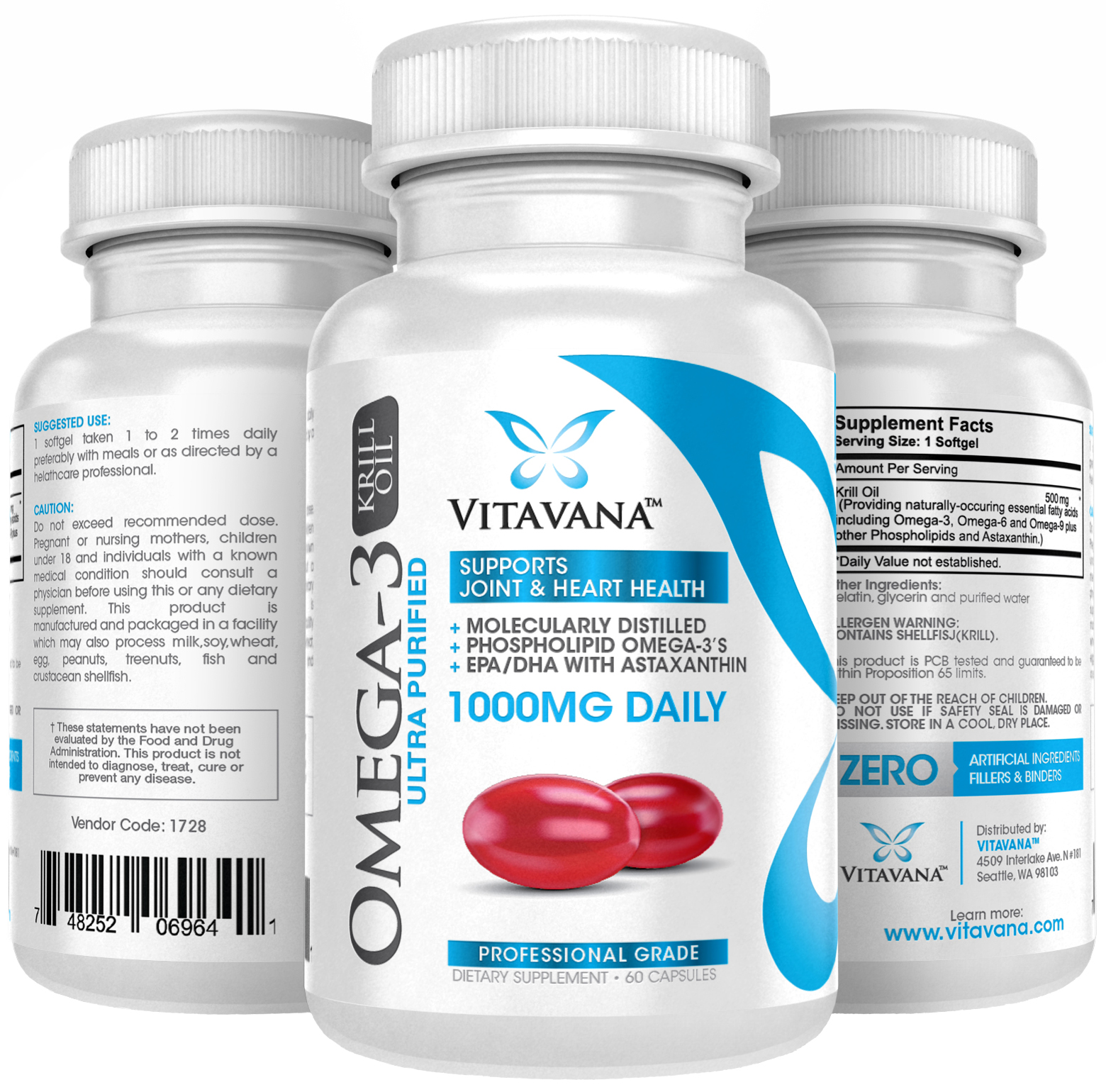MY REVIEW: Vitavana Omega-3 Krill Oil

Product Description
Omega-3 fatty acids, in general - abundant in Vitavana Krill Oil - have been shown to slow the rate by which our body ages at the cellular level -- thereby reducing inflammation, easing joint pain, improving cardiovascular health, eye and skin health, and brain functioning. A diet rich in the essential fatty acids (EFA's) contained in Vitavana Krill Oil can increase your health and well-being. Vitavana Krill Oil fatty acids are vital to nervous system health, ensuring all body systems and brain functions run smoothly.Ingredients
Krill are a type of shrimp-like marine invertebrates and are a common food source of baleen whales, manta rays, whale sharks and numerous other marine animals. The oil derived from Krill is rich in phospholipids, the building blocks for cell membranes, and Essential Fatty Acids including Omega-3, 6 and 9. Krill Oil is very stable, free of heavy metal content and considered more efficient in the body than regular fish oil capsules. Vitavana's Krill Oil delivers a potent 500 milligrams of purified Krill Oil in every easy to absorb soft gelatin capsule.
Directions
As a dietary supplement, take one (1) to three (3) soft gelatin capsules daily
MY REVIEW:
I love taking my omega's. Especially as we age. And I don't eat near as much seafood as I once did when I lived in Alaska. As you read above it is an amazing supplement. I doubled up on it because I suffered the hives this week. And taking more fish oils soothes the healing process of any skin condition.
Okay now let me tell you some more scientific facts about krill oil.
Genes have "switches" that can be flipped on and off, which control virtually every biochemical process in your body. And nutrients like omega-3 fats control those switches. Your liver plays a major role in controlling how your body uses carbohydrates and lipids, utilizing omega-3 and omega-6 fats to sense your nutritional state and influence gene expression accordingly.
Fatty acids help to direct key metabolic processes such as glucose production, lipid synthesis, cellular energy, oxidation, and dozens of others. We now know that various types and sources of omega-3 fat affect liver tissue differently, which is what this study was designed to examine.
Krill oil actually influences your metabolism and genes to improve! The referenced study found that, although both fish oil and krill oil contain omega-3s, they differ greatly in how they affect the genes controlling your metabolism. Krill oil:
- Enhances glucose metabolism in your liver, whereas fish oil does not
- Promotes lipid metabolism, whereas fish oil does not
- Helps regulate the mitochondrial respiratory chain, whereas fish oil does not
- Decreases cholesterol synthesis, whereas fish oil increases it
So, krill will help lower your triglyceride and cholesterol levels and increase your energy production, whereas fish oil does neither and in fact may even raise your cholesterol level, according to the latest research. According to the researchers:
"Elevated hepatic glucose production is associated with metabolic disease in humans (Natali and Ferrannini, 2006), and we observed that krill oil supplementation favorably alters the expression of genes regulating hepatic glucose metabolism."
Prior studies show that krill oil may lower your blood glucose level by increasing glucose uptake by tissues other than your liver. In another study that directly compared krill oil with fish oil, krill oil was significantly more effective in reducing liver triglyceride levels. These studies all suggest krill oil may offer significant benefits for those with the metabolic dysregulation seen in obesity and type 2 diabetes—which is a problem of epidemic proportions in today's world.
Omega-3 fats affect your cellular health and DNA chiefly by how they influence your cell membranes. It is these cell membranes that are critical in switching your genes on and off, because the membranes contain receptors that respond to hormones and other agents, and these are affected by the fatty acids on their surface. Your cell membranes contain EPA, DHA and phospholipids, and all help to shuttle molecules into and out of your cells. Therefore, having ample high quality fatty acids in your system is crucial to keeping your cell membranes working like well-oiled little machines.
An amazing oil! I will always take it over regular fish oils. Plus I do try to eat fish 3 or more times a week.
~Tiffany
Click on the widget below to get yours:
Check out more products on their website here:
Comments
Post a Comment